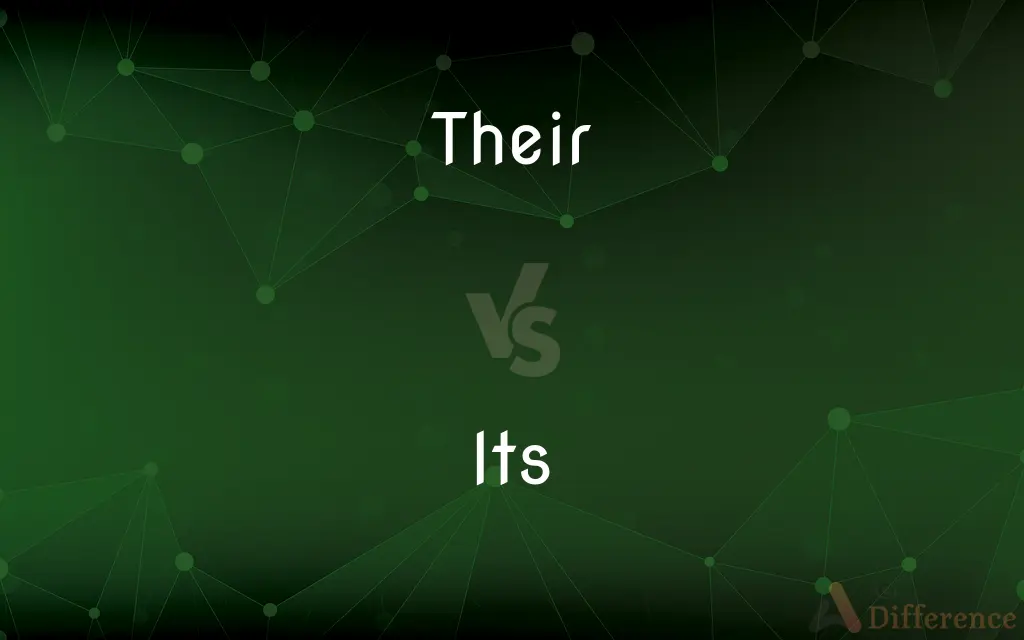Their vs. Its — What's the Difference?
Edited by Tayyaba Rehman — By Fiza Rafique — Updated on October 30, 2023
"Their" is a possessive pronoun referring to something owned by a group, while "its" is a possessive pronoun for singular and neutral objects or animals.

Difference Between Their and Its
Table of Contents
ADVERTISEMENT
Key Differences
"Their" and "Its" both serve as possessive pronouns in the English language. However, "their" denotes possession by multiple entities or people. For instance, when we say "their house," we mean a house that belongs to them, a group of individuals. On the other hand, "its" relates to possession by a singular, neutral entity. An example being, "The dog wagged its tail," where "its" refers to the tail of the singular entity, the dog.
In another perspective, "their" often helps in sentences to avoid specifying gender or to include all genders. For example, "Every student should submit their assignment" suggests that the assignment belongs to every student, irrespective of gender. Conversely, "its" is devoid of any gender implications since it always relates to neutral entities, often animals or inanimate objects, such as in "The company expanded its operations."
Both "their" and "its" play crucial roles in ensuring that sentences do not become redundant. Instead of repeating the noun, these possessive pronouns provide brevity. While "their" could replace "the students'" in "The students' grades were excellent," "its" might replace "the cat's" in "The cat's fur is soft."
The confusion between "their" and "its" sometimes arises from the apostrophe. Contrarily to some beliefs, "its" without an apostrophe is the possessive form. "It's" with an apostrophe is a contraction for "it is" or "it has." "Their" does not have a commonly confused contraction form, making it somewhat straightforward in its usage.
Comparison Chart
Type of Pronoun
Possessive
Possessive
ADVERTISEMENT
Refers To
Group/people
Singular, neutral entities
Example of Usage
Their books are on the table.
The dog wagged its tail.
Associated with
Plural entities
Singular, often inanimate or animals
Apostrophe Usage
No apostrophe in possessive form
No apostrophe in possessive form
Compare with Definitions
Their
Used to describe something as belonging to a group.
Their presentation was well-received.
Its
Possessive form of "it."
The cat licked its paw.
Their
Refers to two or more people or things previously mentioned.
John and Alice took their kids to the park.
Its
Used to describe something as belonging to a singular entity.
The company expanded its services.
Their
Possessive form of "they."
Their car is blue.
Its
Refers to things or ideas.
The software has its flaws.
Their
Used to indicate a person of unspecified gender.
Everyone has their own preferences.
Its
Belonging to or associated with a thing previously mentioned.
The book lost its cover.
Their
Belonging to or associated with people or things previously mentioned.
The students raised their hands.
Its
Refers to animals without specifying gender.
The dog chased its tail.
Their
Used as a modifier before a noun
The politicians boasted of their accomplishments. “It is fatal for anyone who writes to think of their sex” (Virginia Woolf). See Usage Notes at he1, they.
Its
Used as a modifier before a noun
The airline canceled its early flight to New York.
Their
Belonging to, from, of, or relating to, them (plural).
They will meet tomorrow at their convenience
This is probably their cat
Its
Belonging to it.
Their
Belonging to someone (one person, singular).
Its
The one (or ones) belonging to it.
Their
The possessive case of the personal pronoun they; as, their houses; their country.
Nothing but the name of zeal appears'Twixt our best actions and the worst of theirs.
Its
Plural of it
Its
Possessive form of the pronoun it. See It.
Common Curiosities
Why is there no apostrophe in "its" when showing possession?
"Its" without an apostrophe is the possessive form. "It's" with an apostrophe is a contraction for "it is" or "it has."
Can "their" be used for an individual of unknown gender?
Yes, "their" can be used singularly to represent an individual of unknown or unspecified gender.
Is "their" only used for plural entities?
Mostly yes, but "their" can also be used for singular entities to avoid gender specification.
Can "its" be used for people?
No, "its" is typically used for neutral, singular entities, often animals or objects.
Why do people often confuse "its" with "it's"?
The confusion arises because, while most possessives use apostrophes, "its" does not.
What does "its" typically refer to?
"Its" usually refers to a singular, neutral entity, such as an animal, object, or idea.
Is "their" gender-neutral?
Yes, "their" is a gender-neutral pronoun.
When should I use "its" instead of "his" or "her"?
Use "its" for neutral entities, like animals or objects, where gender doesn't apply or is unknown.
Is "their" always plural?
Traditionally, yes. But in modern English, "their" can also be singular to avoid specifying gender.
What's a simple way to remember the difference between "their" and "its"?
"Their" indicates possession by a group or unspecified gender, while "its" denotes possession by a singular, neutral entity.
Can "their" refer to only one person?
Yes, "their" can refer to a singular person when the gender is not specified or is unknown.
Does "their" have a contraction form?
No, "their" does not have a commonly confused contraction form.
Why is there no apostrophe in the possessive form of "their"?
Possessive pronouns, including "their," don't use apostrophes.
Can I use "its" for a baby?
While grammatically correct, it's more common and considered polite to use "his" or "her" for a baby.
Is it okay to use "their" in formal writing for singular entities?
Yes, using "their" as a singular pronoun has gained acceptance, even in formal writing, to avoid gender specificity.
Share Your Discovery

Previous Comparison
Carrier vs. Courier
Next Comparison
Turnip vs. RadishAuthor Spotlight
Written by
Fiza RafiqueFiza Rafique is a skilled content writer at AskDifference.com, where she meticulously refines and enhances written pieces. Drawing from her vast editorial expertise, Fiza ensures clarity, accuracy, and precision in every article. Passionate about language, she continually seeks to elevate the quality of content for readers worldwide.
Edited by
Tayyaba RehmanTayyaba Rehman is a distinguished writer, currently serving as a primary contributor to askdifference.com. As a researcher in semantics and etymology, Tayyaba's passion for the complexity of languages and their distinctions has found a perfect home on the platform. Tayyaba delves into the intricacies of language, distinguishing between commonly confused words and phrases, thereby providing clarity for readers worldwide.
















































